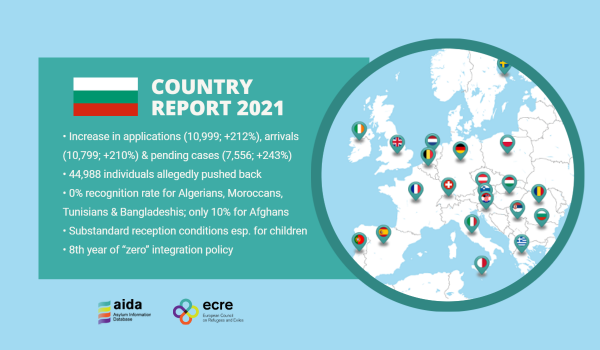The updated AIDA Country Report on Bulgaria provides a detailed overview on legislative and practice-related developments in asylum procedures, reception conditions, detention of asylum seekers and content of international protection in 2021.
2021 was marked by a significant increase of applications for international protection (10,999 applicants, i.e. +212 per cent compared to 2020), arrivals (10,799, i.e. +210 per cent) and pending cases (7,556, i.e. +243 per cent). The increase of applications and arrivals seem to be linked to the regime change in Afghanistan in summer of 2021, the dire security situation in Northern Iraq as well as the political and economic instability in the neighboring Turkey. Bulgaria lacks safe and legal routes for people seeking protection, national border arrangements aims to prevent irregular entries, and pushback practices continue to be widespread. In 2021, the national border monitoring mechanism registered 2,513 alleged pushback incidents, affecting a total of 44,988 individuals.
Discriminatory practices have further been reported in the decision-making process. Nationalities originating from certain countries such as Algeria, Morocco Tunisia and Bangladesh are systematically rejected as manifestly unfounded under the accelerated procedure. Turkish and Afghan nationals also faced very low recognition rates – 8 and 10 per cent respectively. While the examination of Afghan cases is likely to change in 2022, most of the subsequent applications lodged by Afghan nationals after August 2021 were considered as inadmissible by the national asylum agency as of the end of 2021. At second instance, the effectiveness of the judicial system remains heavily criticised due to the lack of expertise and experience of the responsible Section of the Supreme Administrative Court. 82 per cent of all appeals lodged at second instance were rejected in 2021.
The conditions in the vast majority of the reception centers remain overwhelmingly substandard due to inadequate infrastructures, limited hygiene and basic services as well as a serious lack of safety. The existing capacity of safe-zones for children (288 places in total) is highly inadequate not least in light of an increase of unaccompanied children from 799 in 2020 to 3,172 in 2021 (i.e. +296 per cent). As a result, many unaccompanied children were accommodated in mixed facilities with adults and without proper support and guarantees of personal safety. The authorities further continued to apply a mandatory ten days quarantine for COVID-19 reasons to all newly detained third country nationals.
As regards integration, there are no activities planned, funded nor made available to beneficiaries of international protection. 2021 thus marks the eighth consecutive year of the national “zero integration” policy. The national asylum authority further continues to cease or revoke international protection on the basis of a new provision introduced in 2020 which contradicts the Refugee Convention and the recast Qualification Directive. The undue cessation ground has affected 4,364 status holders in total since 2018, out of which 100 persons in 2021.
For further information:
- AIDA 2021 Update: Bulgaria, Summary in Bulgarian, February 2022
This article appeared in the ECRE Weekly Bulletin. You can subscribe to the Weekly Bulletin here.

